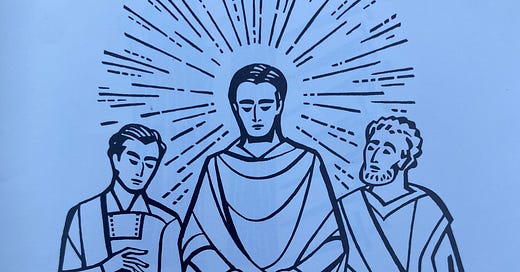Attention consists of suspending our thought, leaving it detached, empty and ready to be penetrated by the object. […] We do not obtain the most precious gifts by going in search of them but by waiting for them.
—Simone Weil, The Right Use of School Studies
“It is the sacred duty of the writer to pay attention,” Kate DiCamillo commanded me via a small slip of yellow paper I received in a workshop during the summer of 2012, and I have written those words upon my heart ever since.
What Kate DiCamillo does not explicitly say in that quote, but it is surely implied, is that paying attention is heartbreaking.
The price of writing is that your heart will always be broken. The price of paying attention is that you will see so many things that are very difficult to see.
Look at it, look at what is in front of you: you see ivory-billed woodpeckers go extinct. It was my dream to see one after I admired daily the ink drawing of the ivory-billed woodpecker in the birding journal my grandmother got for me when I was ten.
Look around you: in a city, we are surrounded by hard surfaces—unnaturally hard, that hurt our joints and our feet. We are surrounded by drab concrete, miserable asphalt, and the detritus of industry. I glut my eyes on beautiful houses, on apartment buildings, on something beautiful.
While visiting my grandmother, I drove her car to the nature preserve near her house we would visit all the time as children. I used to run up and down those paths, unafraid of copperheads, and swim in the lake, unafraid of cottonmouths. Now I pay careful attention where my feet land on the carpet of pine needles. I don’t know if this is the sort of attention that helps you see better. I’m not sure this is the right kind of attention—perhaps my younger self had it right.
But I sat on the edge of the smooth, still lake, looking at golden hour begin to fall over the autumn woods. North Carolina is America to me. It just looks quintessentially American—the few deciduous trees mixed in with the pine forest—and it looks normal. It’s the sort of landscape my eyes expect to see, that feels like home. There is nothing awe-inspiring about it, besides being very beautiful in a very ordinary way.
“The world, under the microscope of your attention, opens up itself as a beautiful flower,” says Kate DiCamillo. Even the ordinary reveals its inner splendor.
The lake is like a mirror, reflecting the sky perfectly. It is beautiful, but I wish it were clear. I wish that it would reveal the secrets underneath it. I would trust it more. Perhaps I would even dip my toes or feet or legs in it. But would it be as beautiful then?
I’m not sure.
I am writing a book about a place that is in the seam zone, between Jerusalem and Bethlehem. How very hard it is to pay attention to all the stories of the people who are there now, who are in Gaza, who are in Ashkelon, who are in Bethlehem, Jerusalem. They are so painful. I do not want to keep looking. So I do not want to write. I do not want to keep looking. What’s the point? What can words do to help? Anything?
I’m not sure words can do anything to help. Or I wouldn’t be, except this weekend I held my grandmother’s hand and recited, over and over again, the psalms of morning prayer, evening prayer, compline, the daily office.
The psalms are written to someone who is looking into the jaws of death. There are so few words that truly express what you need to say in situations where a deeper realm than day-to-day living rips open into your life. When you are living your life outside of the control of the clock. That’s the sort of realm language was not invented to discuss. We invented language to discuss hunting, gathering, child-rearing—you know, human shit. Talking about the other stuff has always challenged us—pushed us out of the realm of literal communication into a more symbolic sphere.
I don’t claim to be David, or a psalmist, or a writer of anything more canonical than what mine and a few other eyes have witnessed. But it is the sacred duty of the writer to first sit and hold the hand of the one in pain. Attention is not just seeing (sorry, Kate DiCamillo), it is a kind of inspiration. It is waiting for the breath of another to enter you. And to write from them and for them.
Don’t roll out a carpet, waiting for the right time to write, my aunt wisely told me. It has to be part of your day-to-day routine, something embodied. Something incarnate.
It is hard to sit and make yourself available to what you would rather avoid. To the things that there are often no words for. It is much easier to distract ourselves. But it is our sacred duty to pay attention. Or, rather, let’s leave behind the language of the market and of commerce—the “attention economy,” as even our attentions are commodified these days. Perhaps it is better said that we give our attention. We give our attention and we are given back life in abundance.





